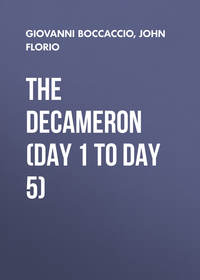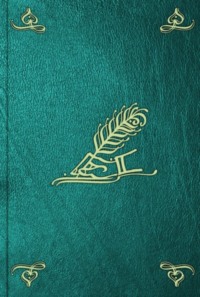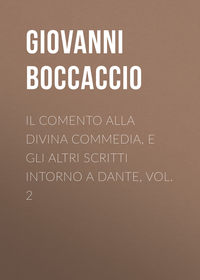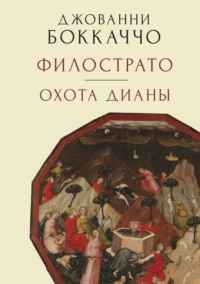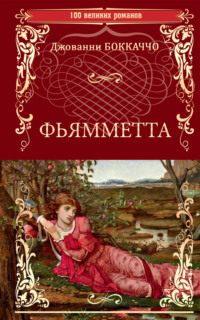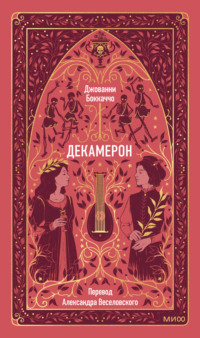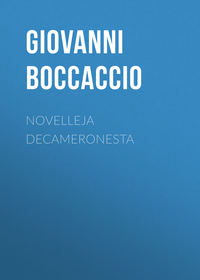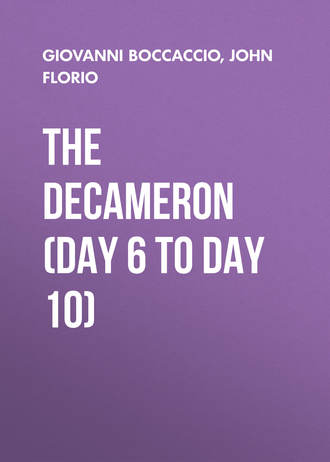 полная версия
полная версияThe Decameron (Day 6 to Day 10)
Having thus agreed upon this conclusion, and had many merry meetings together: one night above the rest, where Frederigo was appointed to suppe with Monna Tessa, who had made ready two fat Capons, drest in most dainty and delicate manner: it fell out so unfortunately, that John (whose Kue was not to come that night) came thither very late, yet before Frederigo, wherewith she being not a little offended, gave John a slight supper, of Lard, Bacon, and such like coarse provision, because the other was kept for a better guest. In the meane time, and while John was at supper, the Maide (by her Mistresses direction) had conveighed the two Capons, with boyled Egges, Bread and a Bottle of Wine (all folded up in a faire cleane table cloth) into her Garden, that had a passage to it, without entering into the house, and where shee had divers times supt with Frederigo. She further willed the Maide, to set all those things under a Peach-tree, which adjoyned to the fields side: but, so angry she was at her husbands unexpected comming, that shee forgot to bid her tarrie there, till Frederigoes comming; and to tell him of Johns being there: as also, to take what he found prepared readie for his Supper.
John and she being gone to bed together, and the Maide likewise, it was not long after, before Frederigo came, and knocking once softly at the doore, which was very neere to their lodging Chamber, John heard the noise, and so did his wife. But to the end, that John might not have the least scruple of suspition, she seemed to be fast asleepe; and Frederigo pausing a while, according to the order directed, knockt againe the second time. John wondering thereat very much, jogd his wife a little, and saide to her: Tessa, hearest thou nothing? Me thinkes one knocketh at our doore. Monna Tessa, who was better acquainted with the knocke, then plaine honest meaning John was, dissembling as if shee awaked out of a drowsie dreame, saide: Alas Husband, dost thou know what this is? In the name of our blessed Ladie, be not affraid, this is but the Spirit which haunts our Countrey houses, whereof I have often told thee, and it hath many times much dismayed me, living heere alone without thy comfort. Nay, such hath bin my feare, that in divers nights past, so soone as I heard the knockes: I was feigne to hide my selfe in the bedde over-head and eares (as we usually say) never daring to be so bold, as to looke out, untill it was broad open day. Arise good wife (quoth John) and if it be such a Spirit of the Countrey, as thou talkest of, never be affraid; for before we went to bed, I said the Telucis, the Intemerata, with many other good prayers beside. Moreover, I made the signe of the Crosse at every corner of our bed, in the name of the Father, Son, and holy Ghost, so that no doubt at all needs to be made, of any power it can have to hurt or touch us.
Monna Tessa, because (perhaps) Frederigo might receive some other suspition, and so enter into distaste of her by anger or offence: determined to arise indeede, and to let him covertly understand, that John was there, and therefore saide to her husband. Beleeve me John, thy counsell is good, and every one of thy words hath wisedome in it: but I hold it best for our owne safety, thou being heere; that wee should conjure him quite away, to the end he may never more haunt our house. Conjure him Wife? Quoth John, By what meanes? and how? Bee patient good man (quoth Tessa) and I will enstruct thee. I have learned an excellent kinde of conjuration; for, the last weeke, when I went to procure the pardons at Fiesola, one of the holy recluse Nuns, who (indeede John) is my indeered Sister and Friend, and the most sanctimonious in life of them all; perceiving me to be troubled and terrified by Spirits; taught me a wholsome and holy prayer, and protested withall, that shee had often made experiment thereof, before she became a Recluse, & found it (alwayes) a present helpe to her. Yet never durst I adventure to essay it, living heere by my selfe all alone: but honest John, seeing thou art heere with me, we will go both together, and conjure this Spirit. John replyed, that he was very willing; and being both up, they went fayre and softly to the doore, where Frederigo stoode still without, and was growne somewhat suspitious of his long attendance.
When they were come to the doore, Monna Tessa said to John: Thou must cough and spet, at such time as I shall bid thee. Well (quoth John) I will not faile you. Immediately she beganne her prayer in this manner.
Spirit, that walkst thus in the night,Poore Countrey people to affright:Thou hast mistane thy marke and ayme,The head stood right, but John home came,And therefore thou must packe away,For I have nothing else to say:But to my Garden get the gone,Under the Peach-tree stands alone,There shalt thou finde two Capons drest,And Egges laide in mine owne Hennes nest,Bread, and a Bottle of good wine,All wrapt up in a cloath most fine.Is not this good Goblins fare?Packe and say you have your share;Not doing harme to John or me,Who this night keepes me companie.No sooner had she ended her devoute conjuring prayer, but she saide to her husband: Now John, cough and spet: which John accordingly did. And Frederigo, being all this while without, hearing her witty conjuration of a Spirit, which he himselfe was supposed to be, being ridde of his former jealous suspition: in the midst of all his melancholy, could very hardly refraine from laughing, the jest appeared so pleasing to him: But when John cought and spet, softly he said to himselfe: When next thou spetst, spet out all thy teeth.
The woman having three severall times conjured the Spirite, in such manner you have already heard; returned to bed againe with her husband: and Frederigo, who came as perswaded to sup with her, being supperlesse all this while; directed by the words of Monna Tessa in hir praier, went into the Garden. At the foot of the Peach-tree, there he found the linnen cloth, with the two hot Capons, Bread, Egges, and a Bottle of Wine in it, all which he carried away with him, and went to Supper at better leysure. Oftentimes afterward, upon other meetings of Frederigo and she together, they laughed heartily at her enchantment, and the honest beleefe of silly John.
I cannot deny, but that some do affirme, that the Woman had turned the face of the Asses head towards Fiesola, and a Country Travailer passing by the Vine, having a long piked staffe on his necke; the staffe, (by chance) touched the head, and made it turne divers times about, & in the end faced Florence, which being the cal for Frederigoes comming, by this meanes he was disappointed. In like manner some say, that Monna Tessaes prayer for conjuring the Spirit, was in this order.
Spirit, Spirit, go thy way,And come againe some other day,It was not I that turnd the head,But some other. In our BedAre John and I: Go from our dore,And see thou trouble us no more.So that Frederigo departed thence, both with the losse of his labour & supper. But a neighbour of mine, who is a woman of good yeares, told me, that both the one and other were true, as she her selfe heard, when she was a little Girle. And concerning the latter accident, it was not to John of Lorrayne, but to another, named John de Nello, that dwelt at S. Peters Gate, and of the same profession as John of Lorrayne was. Wherefore (faire Ladies) it remaineth in your owne choice, to entertain which of the two prayers you please, or both together if you will: for they are of extraordinary vertue in such strange occurrences, as you have heeretofore heard, and (upon doubt) may prove by experience. It shall not therefore be amisse for you, to learne them both by hart, for (peradventure) they may stand you in good sted, if ever you chance to have the like occasion.
Peronella hid a young man her friend and Lover, under a great brewing Fat, upon the sodaine returning home of her Husband; who told her, that hee had solde the saide Fat, and brought him that bought it, to carry it away. Peronella replyed, that shee had formerly solde it unto another, who was nowe underneath it, to see whether it were whole and sound, or no. Whereupon, he being come forth from under it; she caused her Husband to make it neate and cleane, and so the last buyer carried it awayThe Second Novell
Wherein is declared, what hard and narrow shifts and distresses, such as bee seriously linked in Love, are many times enforced to undergo: According as their owne wit, and capacitie of their surprizers, drive them to in extremitiesNot without much laughter and good liking, was the Tale of Madame Æmillia listened unto, and both the prayers commended to be sound and soveraigne: but it being ended, the King commaunded Philostratus, that hee should follow next in order, whereupon thus he began.
Deare Ladies, the deceites used by men towards your sexe, but especially Husbands, have bene so great and many, as when it hath sometime happened, or yet may, that husbands are requited in the self-same kinde: you need not finde fault at any such accident, either by knowledge thereof afterward, or hearing the same reported by any one; but rather you should referre it to generall publication, to the end, that immodest men may know, and finde it for trueth, that if they have apprehension and capacity; women are therein not a jote inferiour to them. Which cannot but redound to your great benefite, because, when any one knoweth, that another is as cunning and subtile as himselfe; he will not be so rashly adventurous in deceite. And who maketh any doubt, that if those sleights and trickes, whereof this dayes argument may give us occasion to speake, should afterwardes be put in execution by men: would it not minister just reason, of punishing themselves for beguiling you, knowing, that (if you please) you have the like abilitie in your owne power? Mine intent therefore is to tell you, what a woman (though but of meane quality) did to her husband, upon a sodaine, and in a moment (as it were) for her owne safety.
Not long since, there lived in Naples, an honest meane man, who did take to Wife, a fayre and lustie young Woman, being named Peronella. He professing the Trade of a Mason, and shee Carding and Spinning, maintained themselves in a reasonable condition, abating and abounding as their Fortunes served. It came to passe, that a certayne young man, well observing the beauty and good parts of Peronella, became much addicted in affection towardes her: and by his often and secret sollicitations, which he found not to be unkindely entertayned; his successe proved answerable to his hope, no unindifferencie appearing in their purposes, but where her estate seemed weakest, his supplies made an addition of more strength.
Now, for their securer meeting, to stand cleare from all matter of scandal or detection, they concluded in this order between themselves. Lazaro, for so was Peronellaes Husband named, being an earely riser every morning, either to seeke for worke, or to effect it being undertaken: this amorous friend being therewith acquainted, and standing in some such convenient place, where hee could see Lazaroes departure from his house, and yet himselfe no way discerned; poore Lazaro was no sooner gone, but presently he enters the house, which stood in a verie solitarie street, called the Avorio. Many mornings had they thus met together, to their no meane delight and contentation, till one especiall morning among the rest, when Lazaro was gone forth to worke, and Striguario (so was the amorous young man named) visiting Peronella in the house: upon a very urgent occasion, Lazaro returned backe againe, quite contrary to his former wont, keeping foorth all day, and never comming home till night.
Finding his doore to be fast lockt, and he having knockt softlie once or twice, he spake in this manner to himselfe. Fortune I thanke thee, for albeit thou hast made mee poore, yet thou hast bestowed a better blessing on me, in matching me with so good, honest, & loving a Wife. Behold, though I went early out of my house, her selfe hath risen in the cold to shut the doore, to prevent the entrance of theeves, or any other that might offend us. Peronella having heard what her husband sayde, and knowing the manner of his knocke, said fearfully to Striguario. Alas deare friend, what shall wee doe? I am little lesse then a dead Woman: For, Lazaro my Husband is come backe again, and I know not what to do or say. He never returned in this order before now, doubtlesse, hee saw when you entred the doore; and for the safety of your honour and mine: creepe under this brewing Fat, till I have opened the doore, to know the reason of his so soone returning.
Striguario made no delaying of the matter, but got himselfe closelie under the Fat, and Peronella opening the doore for her husbands enterance, with a frowning countenance, spake thus unto him. What meaneth this so early returning home againe this morning? It seemeth, thou intendest to do nothing to day, having brought backe thy tooles in thy hands. If such be thine intent, how shall we live? Where shal we have bread to fill our bellies? Dooest thou thinke, that I will suffer thee to pawne my gowne, and other poore garments, as heeretofore thou hast done? I that card and spinne both night and day, till I have worne the flesh from my fingers; yet all will hardly finde oyle to maintaine our Lampe. Husband, husband, there is not one neighbour dwelling by us, but makes a mockerie of me, and tels me plainly, that I may be ashamed to drudge and moyle as I do; wondering not a little, how I am able to endure it; and thou returnest home with thy hands in thy hose, as if thou hadst no worke at all to do this day.
Having thus spoken, she fell to weeping, and then thus began again. Poore wretched woman as I am, in an unfortunate houre was I borne, and in a much worse, when I was made thy Wife. I could have had a proper, handsome young man; one, that would have maintained mee brave and gallantly: but, beast as I was, to forgoe my good, and cast my selfe away on such a beggar as thou art, and whom none wold have had, but such an Asse as I. Other women live at hearts ease, and in jollity, have their amorous friends and loving Paramours, yea, one, two, three at once, making their husbands looke like a Moone cressent, whereon they shine Sun-like, with amiable lookes, because they know not how to helpe it: when I (poore foole) live heere at home a miserable life, not daring once to dreame of such follies, an innocent soule, heartlesse and harmelesse.
Many times, sitting and sighing to my selfe: Lord, thinke I, of what mettall am I made? Why should not I have a Friend in a corner, as well as others have? I am flesh and blood, as they are, not made of brasse or iron, and therefore subject to womens frailty. I would thou shouldest know it husband, and I tell it thee in good earnest; That if I would doe ill, I could quickely finde a friend at a neede. Gallants there are good store, who (of my knowledge) love me dearely, and have made me very large and liberall promises, of Golde, Silver, Jewels, and gay Garments, if I would extend them the least favour. But my heart will not suffer me, I never was the daughter of such a mother, as had so much as a thought of such matters: no, I thanke our blessed Ladie, and S. Friswid for it: and yet thou returnest home againe, when thou shouldst be at Worke.
Lazaro, who stoode all this while like a well-beleeving Logger-head, demurely thus answered. Alas good Wife! I pray you bee not so angry, I never had so much as an ill thought of you, but know wel enough what you are, and have made good proofe thereof this morning. Understand therefore patiently (sweet Wife) that I went forth to my work as dayly I use to do, little dreaming (as I thinke you doe not) that it had bene Holy-day. Wife, this is the Feast day of Saint Galeone; whereon we may in no wise worke, and this is the reason of my so soone returning. Neverthelesse (deare Wife) I was not carelesse of our Houshold provision: For, though we worke not, yet we must have foode, which I have provided for more then a moneth. Wife, I remembred the brewing Fat, whereof wee have little or no use at all, but rather it is a trouble to the house, then otherwise. I met with an honest Friend, who stayeth without at the doore, to him I have sold the Fat for ten Gigliatoes, and he tarrieth to take it away with him.
How Husband? replied Peronella, Why now I am worse offended then before. Thou that art a man, walkest every where, and shouldst be experienced in worldly affaires: wouldst thou bee so simple, as to sell such a brewing Fat for ten Gigliatoes? Why, I that am a poore ignorant woman, a house-Dove, sildome going out of my doore: have sold it already for twelve Gigliatoes, to a very honest man, who (even a little before thy comming home) came to me, we agreed on the bargaine, and he is now underneath the Fat, to see whether it be sound or no. When credulous Lazaro heard this, he was better contented then ever, and went to him that taried at the doore, saying. Good man, you may goe your way, for, whereas you offered me but ten Gigliatoes for the Fat, my loving wife hath sold it for twelve, and I must maintaine what shee hath done: so the man departed, and the variance ended.
Peronella then saide to her husband. Seeing thou art come home so luckily, helpe me to lift up the Fat, that the man may come foorth, and then you two end the bargaine together. Striguario, who though he was mewed up under the tubbe, had his eares open enough; and hearing the witty excuse of Peronella, tooke himselfe free from future feare: and being come from under the Fat, pretending also, as if he had herd nothing, nor saw Lazaro, looking round about him, said. Where is this good woman? Lazaro stepping forth boldly like a man, replyed: Heere am I, what wold you have Sir? Thou? quoth Striguario, what art thou? I ask for the good wife, with whom I made my match for the Fat. Honest Gentleman (answered Lazaro) I am that honest Womans Husband, for lacke of a better, and I will maintaine whatsoever my Wife hath done.
I crie you mercie Sir, replyed Striguario, I bargained with your Wife for this brewing Fat, which I finde to be whole and sound: only it is uncleane within, hard crusted with some dry soile upon it, which I know not well how to get off, if you will be the meanes of making it cleane, I have the money heere ready for it. For that Sir (quoth Peronella) take you no care, although no match at all had beene made, what serves my Husband for, but to make it cleane? Yes forsooth Sir, answered sily Lazaro, you shall have it neate and cleane before you pay the mony.
So, stripping himselfe into his shirt, lighting a Candle, and taking tooles fit for the purpose; the Fat was whelmed over him, and he being within it, wrought untill he sweated, with scraping and scrubbing. So that these poore Lovers, what they could not accomplish as they wold, necessity enforced them to performe as they might. And Peronella, looking in at the vent-hole, where the Liquor runneth forth for the meshing; seemed to instruct her husband in the businesse, as espying those parts where the Fat was fowlest, saying: There, there Lazaro, tickle it there, the Gentleman payes well for it, and is worthy to have it: but see thou do thy selfe no harme good Husband. I warrant thee Wife, answered Lazaro, hurt not your selfe with leaning your stomacke on the Fat, and leave the cleansing of it to me. To be breefe, the Brewing Fat was neatly cleansed, Peronella and Striguario both well pleased, the money paide, and honest meaning Lazaro not discontented.
Friar Reynard, falling in love with a Gentlewoman, Wife to a man of good account; found the meanes to become her Gossip. Afterward, he being conferring closely with her in her Chamber, and her Husband coming sodainly thither: she made him beleeve, that he came thither for no other end; but to cure his God-sonne by a charme, of a dangerous disease which he had by WormesThe Third Novell
Serving as a friendly advertisement to married women, that Monks, Friars, and Priests may be none of their Gossips, in regard of unavoydable perilles ensuing therebyPhilostratus told not this Tale so covertly, concerning Lazaros simplicity, and Peronellaes witty policy; but the Ladies found a knot in the rush, and laughed not a little, at his queint manner of discoursing it. But upon the conclusion, the King looking upon Madam Eliza, willed her to succeede next, which as willingly she granted, and thus began. Pleasant Ladies, the charme or conjuration wherewith Madam Æmillia laid her night-walking Spirit, maketh me remember a Novell of another enchantment; which although it carrieth not commendation equall to the other, yet I intend to report it, because it suteth with our present purpose, and I cannot sodainly be furnisht with another, answerable thereto in nature.
You are to understand then, that there lived in Siena, a proper young man, of good birth and well friended, being named Reynard. Earnestly he affected his neere dwelling neighbour, a beautifull Gentlewoman, and wife to a man of good esteeme: of whom hee grew halfe perswaded, that if he could (without suspition) compasse private conference with her, he should reach the height of his amorous desires. Yet seeing no likely meanes wherewith to further his hope, and shee being great with childe, he resolved to become a Godfather to the childe, at such time as it should be brought to Christening. And being inwardly acquainted with her Husband, who was named Credulano; such familiar entercourses passed betweene them, both of Reynards kinde offer, and Credulanoes as courteous acceptance, that hee was set downe for a Gossippe.
Reynard being thus embraced for Madam Agnesiaes Gossip, and this proving the onely colourable meanes, for his safer permission of speech with her, to let her now understand by word of mouth, what long before she collected by his lookes and behaviour: it fell out no way beneficiall to him, albeit Agnesia seemed not nice or scrupulous in hearing, yet she had a more precious care of her honour. It came to passe, within a while after (whether by seeing his labour vainly spent, or some other urgent occasion moving him thereto, I know not) Reynard would needs enter into Religion, and whatsoever strictnesse or austeritie hee found to be in that kinde of life, yet he determined to persevere therein, whether it were for his good or ill. And although within a short space, after he was thus become a Religious Monke, hee seemed to forget the former love which he bare to his gossip Agnesia, and divers other enormous vanities beside: yet let me tell you, successe of time tutord him in them againe; and, without any respect to his poore holy habite, but rather in contempt thereof (as it were) he tooke an especiall delight, in wearing garments of much richer esteeme, yet favoured by the same Monasticall profession, appearing (in all respects) like a Court-Minion or Favourite, of a sprightly and Poeticall disposition, for composing Verses, Sonnets, and Canzons, singing them to sundry excellent instruments, and yet not greatly curious of his company, so they were some of the best, and Madame Agnesia one, his former Gossip.
But why doe I trouble my selfe, in talking thus of our so lately converted Friar, holy Father Reynard, when they of longer standing, and reputed meerely for Saints in life, are rather much more vile then hee? Such is the wretched condition of this world, that they shame not (fat, soggie, and nastie Abbey-lubbers) to shew how full fedde they live in their Cloysters, with cherry cheekes, and smooth shining lookes, gay and gaudy garments, far from the least expression of humility, not walking in the streets like Doves: but high-crested like Cockes, with well cramd gorges. Nay, which is worse, if you did but see their Chambers furnished with Gally-pots of Electuaries, precious Unguents, Apothecary Boxes, filled with various Confections, Conserves, excellent Perfumes, and other goodly Glasses of artificiall Oyles and Waters: beside Rundlets and small Barrels full of Greeke Wine, Muscatella, Lachrime Christi, and other such like most precious Wines, so that (to such as see them) they seeme not to bee Chambers of Religious men; but rather Apothecaries Shoppes, or appertaining to Druggists, Grocers, or Perfumers.


